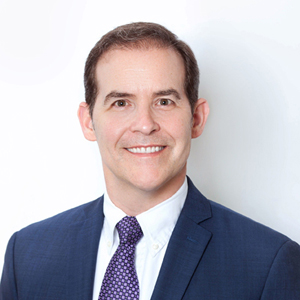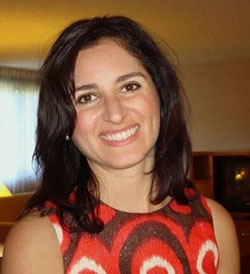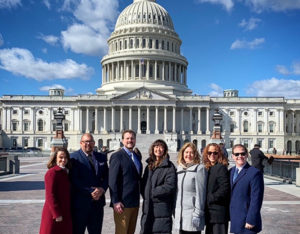DBSA offers more online support during the COVID-19 crisis
In the wake of the coronavirus outbreak, many DBSA chapters are reporting interruptions in their regularly scheduled support group meetings. In some cases, facilitators and participants are considered at higher risk for developing coronavirus. Many meeting locations have temporarily cancelled group gatherings in line with state and local governments calling for social distancing to avoid crowds or public meetings of 10 or more. As a result, some of our chapters are temporarily suspending support group meetings. Others are substituting telephone or video call meetings to best support their peers. Be sure to check with your local group to see how they are meeting right now.
To help everyone find alternative sources of support, DBSA has added 5 new online support groups for our peer community.
Learn more about Online Support Groups
Supporting Youth Mental Health: Understanding media anxiety in young people
Most millennials can probably tell you exactly where they were on September 11, 2001. It was a cornerstone moment in world news, and it shaped future generations. Stories of the devastation were seen by billions worldwide, including countless young people. As one study explains: “After the World Trade Center attacks, children aged 5 through 18 who watched television without any restrictions had more severe stress symptoms than those whose viewing was restricted[1].”
Nearly a generation later, children consume even more media stories, given the heightened prevalence of digital media. It’s more important than ever to understand the effects of news coverage on children, teens and young adults, especially those with mood disorders.
Children under 6 years old engage in “magical thinking,” which can make media stories difficult for them to differentiate from reality. Children who see news of a terrorist attack in another country may be unable into understand that they are distanced from that event and are safe.
Children ages 7 through 11 can see more than one perspective and can think more logically about world events. However, they may not fully understand impact of devastating news. Children at this age are especially concerned with their own safety and the safety of their families.
Teenagers begin to show signs of more abstract thinking. Their increased ability to think creatively, take on multiple perspectives and focus on ethics allows them to digest news through a more discerning and critical lens. However, teenagers have heightened emotions, often driven by hormonal changes that may make serious news hard to put in perspective.
With the current news cycle and fears around coronavirus, it is easy to see how kids might feel an increased stress response. Ultimately it is important to consider the developmental age of your child and facilitate conversations that are age-appropriate. Often, it’s about giving the right amount of information and considering how your own feelings may shape the conversation. By staying emotionally grounded and focusing on the facts, you’ll be able to facilitate a more supportive, productive conversation within the family.
[1] Joshi, P. T., Parr, A. F., & Efron, L. A. (2008). TV Coverage of Tragedies: What is the Impact on Children? Indian Pediatrics, 45.
A note from Michael

Providing help, support, hope, and education is at the core of what we at DBSA strive to offer every day. Even in the best of circumstances, we know that there is always one more resource we could be offering or one additional perspective to share that could make a difference for someone. The world is not in the best circumstances right now; the COVID-19 virus has turned our lives and routines upside down. But DBSA’s mission remains the same, and we are committed to providing you with information and avenues for continued support during these challenging times.
As you read this month’s e-newsletter, you will find ways in which DBSA is enhancing options for support. We are now offering 11 online support groups each week. Three new groups started this week; two more will follow shortly.
The feedback from online support group attendees is very positive, yet the waiting lists and number of new registrants continues to grow. We’re fortunate to welcome Chrissy Gargano to our team, whose role is to secure new grants to allow us to expand services. Responses to proposals, however, take time. For those of you in a position to help today so more people living with depression or bipolar disorder can access support, please consider contributing at this time.
We will continue to offer more lifestyle tips in the Wellness Toolbox on our website. In case you missed it, DBSA recently distributed a new podcast featuring Dr. LaGenia Bailey that includes helpful ways to manage stress and anxiety and stay connected with family and friends who lend you strength and support. Listen to the podcast.
Communicating with you—and hearing from you—is more important than ever. This week we welcomed Betsey O’Brien, our new communications director, who will ensure we can provide even more information and useful resources with our community.
Please help us understand how we can support you during this time of uncertainty.
Let us know what resources would be most beneficial for your wellness.
Ask the Doc
Life Unlimited: Krista Samimi

One year later, I questioned my diagnosis. I did little to educate myself on bipolar and began to tinker with my medications. Soon, the anxiety, paranoia, and delusions returned, with much greater intensity. That is when I got a glimpse inside the walls of a psychiatric facility. (No balloons and flowers here.) This stay only lasted 7 days, but recovery lasted months.
Upon discharge, a nurse recommended the DBSA Berkeley, California support group. This group impacted me greatly—listening to others tell their stories, their struggles, I began to hear my own. Racing thoughts, spending sprees, direct contact with God…their experiences were mine too. I was in disbelief, but relieved. This was real. I wasn’t making it up. I was very healthy and stable for many years.
In 2009, stress from work affected my sleep and I didn’t have a plan to manage my symptoms. I was doing my best to stay above water, but over the course of 2 months, the symptoms were too intense, and I found myself in in-patient treatment again—this time for 72 days. By the grace of God, I recovered enough over the subsequent 15 months to return to a new, less stressful career. Since then I’ve also gotten married and started a family. I feel grateful that I could work closely with my ob/gyn and psychiatrist to have a safe pregnancy with medications.
I continue to stay well with the love and support of my husband, a daily yoga practice, and a collaborative relationship with my psychiatrist. I’m also helping to start a DBSA support group in my area. Some days are better than others, but I am grateful for recovery.
Read more Life Unlimited stories
New leadership for our Young Adult Council
The goal of DBSA’s Young Adult Council (YAC) is to assist in developing outreach and specialized programming to help young adults as they transition from family support to independence. Here are some personal thoughts from the 3 new officers who will lead YAC in the year ahead.
Mary Jane (MJ) Coppock – YAC Chair
“I joined YAC a few years ago when I was a senior in college. I had struggled throughout my schooling without adequate mental health support, and in researching my thesis about bipolar and depression, I came across DBSA and YAC! I loved the idea of creating and collaborating in supportive and healing communities that I largely missed growing up, so I jumped at the opportunity.”
Read Mary Jane’s full interview
Sonam Vyas – YAC Vice Chair
“I’m most passionate about shaping the Young Adult Council into an accessible resource for those who are seeking information. Many people with depression or bipolar disorder, especially in the young adult age range, can often feel very isolated. I hope that YAC will be able to provide resources that show people that others have walked in their shoes before and that there is always a way forward.”
Olivia Eiler – YAC Secretary
“My biggest passions are empowering and educating others. Isolation is one of my most challenging symptoms, and DBSA support groups have helped me on my path to wellness by letting me know I’m not alone in my experiences. I look forward to working with YAC members on projects to reduce mental health stigma and build awareness of DBSA programs and services.”
DBSA shares value of certified peer support specialists with congressional staffers
On February 27, more than 25 staffers serving members of the U.S. Congress learned how integrating peer support specialists into the delivery of health services can lead to better outcomes. This education took place during a congressional briefing that included opening remarks from DBSA CEO Michael Pollock, followed by a moderated panel discussion. In his remarks, Pollock shared statistics that illustrate the state of mental health care for military personnel, veterans and seniors. You can find those statistics here.
The panel of experts shared real-world experiences that highlighted the value of certified peer support specialists in producing better health outcomes and addressing the mental health workforce shortage. Panelists emphasized that making peer support specialists part of total health care can:
- Increase engagement with physical health providers
- Improve mental health outcomes
- Support suicide prevention programs
- Strengthen community engagement
While discussing her role as peer specialist and recovery services program manager at Edward Hines Jr. VA Hospital in suburban Chicago, Dr. Megan Mayberry gave an example of how peer support specialists improve the re-engagement rate after a veteran has missed an appointment. She noted that 31% of veterans who missed health care visits but heard from a peer support specialist returned to the hospital’s health and wellness program. In comparison, the return rate among vets who received only a routine phone call was just 13%.
As director of behavioral health integration in the Los Angeles service area of Providence Health & Services, Dr. Karen Rentas shared that only 42% of seniors experiencing depression seek help. Yet she had observed that after working with a peer support specialist, some seniors in the program at Facey Medical Clinic Mission Hills took that first step and scheduled an appointment with behavioral health services.
DBSA was honored to have two veteran peer support specialists—Ben Bramer and Yuki Imai— serve on the panel. The two outlined how lived mental health experience enables them to help fellow veterans develop the confidence to manage their own overall health and wellness, touching on ways they have helped vets who have suicidal thoughts.
All year long, DBSA engages in outreach to public policy decision-makers to build awareness of the value that certified peer support specialists bring to our health care system. We will keep you apprised of other outreach programs in future columns. In the meantime, please read the next issue of Making Mental Health Matter, where you’ll find an audio link to the congressional briefing, along with written transcripts.
From esperanza: Burnout to balance – dealing with chronic stress and depression
Chronic stress can make us lose sight of what brings us joy. Rediscovering that joy—and letting go of guilt—just might tip the scales back to happiness.
Wellness tips for anxious times
With coronavirus and other challenges all around us, these can be stressful times. Here are helpful suggestions for managing the pressure you may be feeling. Special thanks to our Young Adult Council for their contributions.
Communicate with others
With anxiety and depressive conditions, it takes a lot of time and work to learn how to care for yourself, but just as important is figuring out how to communicate your needs to loved ones and asking for help when needed. Don’t be afraid to ask for the support you need.
Go for a walk
Getting outside gives you the chance to connect with nature. Find an activity that works for you that is away from all of the technology of today, and use it as a way to decompress. Also, check in with yourself mentally every now and then. Sometimes, it’s easy to forget mental health during busy days and work schedules, but maintaining your mental health is at the core of your ability to function.
Healthy habits and mindfulness
To prevent the spread of COVID-19, health experts recommend that you avoid touching your face and wash your hands frequently, spending at least 20 seconds each time. You can use these seconds as a moment of brief meditation. A few deep breaths can be a quick way to settle your mind and improve your mood.



